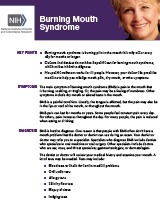Burning Mouth Syndrome
On this page
Overview
Burning Mouth Syndrome (BMS) is a painful condition often described as a burning, scalding, or tingling feeling in the mouth that may occur every day for months or longer. Dry mouth or an altered taste in the mouth may accompany the pain.
Burning mouth syndrome can be difficult to diagnose, and your dentist or doctor will rule out other conditions before diagnosing burning mouth syndrome.
Advocating for yourself and forming a partnership with a dentist or doctor you trust can be helpful throughout the process of getting a diagnosis.
Back to topCauses
Primary BMS. If BMS isn’t caused by an underlying medical problem, it is called primary BMS. Experts believe that primary BMS is caused by damage to the nerves that control pain and taste.
Secondary BMS. Certain medical conditions can cause BMS. Treating the medical problem will cure the secondary BMS. Common causes of secondary BMS include:
- Oral habits such as tooth grinding or jaw clenching.
- Depression.
- Hormonal changes (such as from diabetes or thyroid problem).
- Allergies to dental products, dental materials (usually metals), or foods.
- Dry mouth, which can be caused by certain disorders (such as Sjögren’s syndrome) and treatments (such as certain drugs and radiation therapy).
- Certain medicines, such as those that reduce blood pressure.
- Nutritional deficiencies (such as a low level of vitamin B or iron).
- Infection in the mouth, such as a yeast infection.
- Acid reflux.
Symptoms
The main symptom of burning mouth syndrome (BMS) is pain in the mouth that feels like burning, scalding, or tingling. Or, the pain may happen with a feeling of numbness, which comes and goes. Other symptoms include dry mouth or altered taste in the mouth.
BMS is a painful condition. Usually, the tongue is affected but the pain may also be in the lips, the roof of the mouth, or throughout the mouth.
BMS pain can last for months or years. Some people feel constant pain every day. For others, pain increases throughout the day. For many people, the pain is reduced when eating or drinking.
Back to topDiagnosis
BMS is hard to diagnose. One reason is that people with BMS often don’t have a mouth problem that can be seen during an exam.
Talk to your dentist first. About one-third of people with BMS have an oral habit such as tooth grinding or jaw clenching that can lead to BMS. Dentists are familiar with oral habits and can help you manage them.
Your dentist may refer you to a specialist in oral surgery, oral medicine, or oral pathology who can assist with diagnosing or treating BMS. Ear, nose, and throat specialists can also treat this condition.
To diagnose BMS, a dentist or doctor will review your medical history and examine your mouth. Additional tests may be needed such as:
- Blood tests to check for certain medical problems.
- Oral swab tests.
- Allergy tests.
- Salivary flow test.
- Tissue biopsy.
- Imaging tests.
Treatment
Your dentist may help you manage oral habits that contribute to BMS, such as tooth grinding or jaw clenching.
Your dentist or doctor may prescribe medication that can help control pain and relieve dry mouth. Sometimes a small dose of topical or systemic clonazepam might help with BMS pain.
Because BMS is a complex pain disorder, the treatment that works for one person may not work for another.
Symptoms of secondary BMS may go away when the underlying medical condition, such as diabetes or yeast infection, is treated. If a drug is causing the problem, a doctor may switch you to a different medicine.
Back to topHelpful Tips
To help ease the pain, sip a cold beverage, suck on ice chips, or chew sugarless gum.
Avoid things that can irritate your mouth, such as:
- Tobacco.
- Hot, spicy foods.
- Alcoholic beverages.
- Mouthwash that contains alcohol.
- Products high in acid such as citrus fruits and juices.
Ask your dentist and doctor for other helpful tips.
Back to topRelated Publications
September 2022

